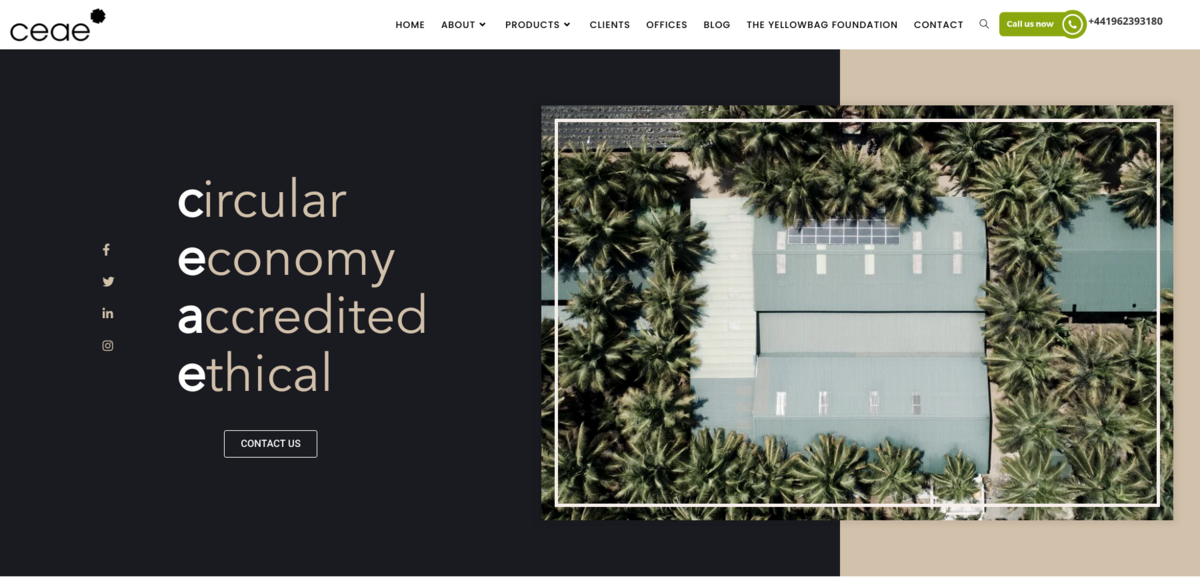WHAT THE PROJECT IS
Sustainable packaging made from recycled cotton paper is changing the way businesses think about environmental responsibility. In the face of climate change headlines, fast-fashion impacts, and the notorious problem of single-use plastics, Ceae emerges as the pioneer of a sustainable packaging revolution. This project centers on producing 100% tree‐free recycled cotton paper that is entirely made from apparel waste. It is all about transforming the sourcing of raw materials and the production process—using farmyard cotton, industrial waste, and renewable energy—to deliver recycled, non-toxic labelling and packaging that do not harm the planet. Imagine packaging reimagined with recycled cotton paper labels, sustainable tapes, biodegradable clothes hangers, and eco-friendly materials that are not only innovative but also a vital contribution towards a circular fashion economy… A circular economy where waste transforms into wealth, ensuring that textiles and clothes re-enter the cycle as raw materials rather than end up in overflowing landfills.
MAIN BENEFITS
- The UK invested over £200 million into sustainable packaging development in 2018.
- Dozens of eco-friendly packaging options currently exist, with more emerging each year.
- The overwhelming majority of Millennial and Gen Z consumers are willing to pay more for sustainable products.
- More than half of supply chain professionals expect a greater focus on circular economy strategies in the next 2 years.
These figures reveal just how significant the momentum behind sustainable packaging really is. The integration of recycled cotton paper, derived from apparel off-cuts, and the shift from virgin resources underline a commitment to reducing waste and energy-intensive production.
REIMAGINING PACKAGING FOR FASHION
Ceae is rethinking packaging for the fashion industry, designing and manufacturing sustainable labels, trims, and packaging for retailers of all shapes and sizes. From clothing labels and care tags to carrier bags and cardboard boxes, every detail now embodies a greener, cleaner future. The project leverages recycled cotton paper labels that are not only printed with vegetable-based, chemical-free inks but produced in a solar-powered plant with zero water discharge. It is all about replacing conventional methods with innovative, ethical, and eco-friendly practices. This transformation is not only a statement against fast fashion but a call to rethink how every step in the process—from production to post-consumption—can be sustainable.
SUSTAINABLE PRODUCTS AND TAILORED SOLUTIONS
At its core, the project is about offering tailored sustainable packaging solutions for a variety of fashion brands. Whether the clothes are bought online or in stores, every garment comes with a story that begins with its packaging. Recycled cotton paper labels, sustainable tapes and elastics, and biodegradable garment packaging are just a part of a broader shift toward eco-friendly practices. The project also addresses the challenge of plastic waste by breaking down PET bottles into a purified liquid used as a sustainable polyester filament yarn. This yarn is then transformed into woven labels, tapes, and elastics. The result? Innovative alternatives to plastic packaging, marking a decisive step toward more ethical and accountability-driven fashion production.
CLOSING THE LOOP ON FAST FASHION
The packaging revolution calls for an end to new virgin resource production and a shift towards a circular economy. This means transforming how raw materials are sourced, processed, and reintegrated back into the manufacturing cycle. When recycled packaging materials become the standard, the environmental costs associated with producing new packaging drop significantly. Every piece of apparel now has the potential to inspire a cycle of renewal… from recycled paper pulp derived from off cuts to tree-free printed packaging that boasts sustainability at its core. In this dynamic environment, consumer choices really matter—sustainable products are not just an option, they are the future.
A CLEANER AND GREENER WAY OF DOING BUSINESS
Sustainability in the fashion industry is more than just a trend—it is a mission to reimagine every stage of a product’s life cycle. With 26 million tons of textile waste filling national landfills each year and 6 billion trees felled annually for paper production, the imperative to act becomes impossible to ignore. Ceae is leading a transformative journey to minimize the use of virgin resources and maximize recycled content. The initiative focuses on sustainability with every step: from solar-powered production and non-toxic inks to biodegradable garment packaging. It is a declaration that the environmental cost of unsustainable production is one that can and must be changed.
PROJECT IMPACT
- SDG 12: Responsible Consumption and Production
- SDG 13: Climate Action
- SDG 15: Life on Land
- SDG 9: Industry, Innovation, and Infrastructure
The project clearly aligns with global sustainability goals, showcasing how ethical manufacturing and circular economies can drive transformative change. Each SDG mentioned here reflects the multi-faceted impact of transitioning to recycled, eco-friendly packaging and a truly circular production cycle.
A VISION FOR THE FUTURE
Looking forward, the vision is a cleaner and greener future where sustainable packaging becomes the norm rather than the exception. This dynamic transformation is not just about reducing environmental footprints—it’s about inspiring a complete rethinking of resource usage, production, and waste management across the fashion world. The subtle shift from conventional, wasteful packaging methods to innovative and responsible practices sets the stage for a revolution in how the industry contributes to a healthy planet. With recycled cotton paper and other sustainable materials paving the way, the industry is ready to embrace practices that respect the environment and uphold a future where every piece of packaging contributes to a lasting legacy of sustainability. Ultimately, the project is a bold step towards a world where fast fashion is replaced by circular, thoughtful, and innovative production methods… ushering in an era that values both style and the health of the planet.


















